The AMD 2nd Gen Ryzen Deep Dive: The 2700X, 2700, 2600X, and 2600 Tested
by Ian Cutress on April 19, 2018 9:00 AM ESTCPU Legacy Tests
Our legacy tests represent benchmarks that were once at the height of their time. Some of these are industry standard synthetics, and we have data going back over 10 years. All of the data here has been rerun on Windows 10, and we plan to go back several generations of components to see how performance has evolved.
All of our benchmark results can also be found in our benchmark engine, Bench.
3D Particle Movement v1
3DPM is a self-penned benchmark, taking basic 3D movement algorithms used in Brownian Motion simulations and testing them for speed. High floating point performance, MHz and IPC wins in the single thread version, whereas the multithread version has to handle the threads and loves more cores. This is the original version, written in the style of a typical non-computer science student coding up an algorithm for their theoretical problem, and comes without any non-obvious optimizations not already performed by the compiler, such as false sharing.
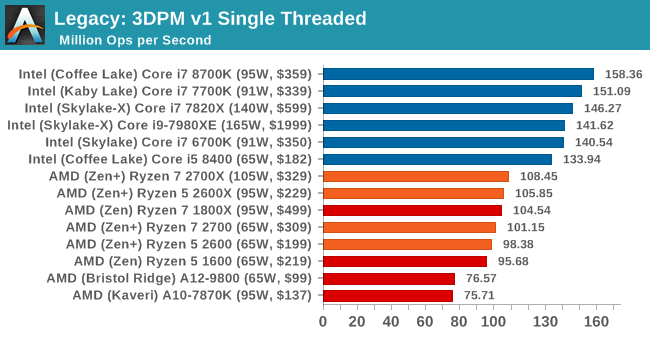
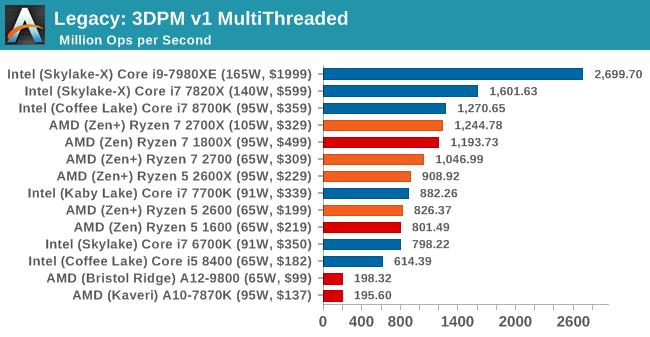
CineBench 11.5 and 10
Cinebench is a widely known benchmarking tool for measuring performance relative to MAXON's animation software Cinema 4D. Cinebench has been optimized over a decade and focuses on purely CPU horsepower, meaning if there is a discrepancy in pure throughput characteristics, Cinebench is likely to show that discrepancy. Arguably other software doesn't make use of all the tools available, so the real world relevance might purely be academic, but given our large database of data for Cinebench it seems difficult to ignore a small five minute test. We run the modern version 15 in this test, as well as the older 11.5 and 10 due to our back data.
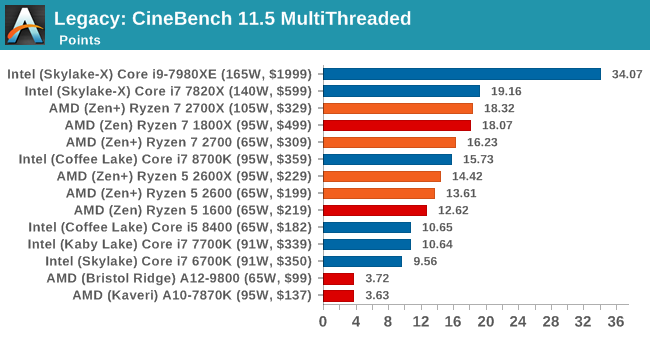
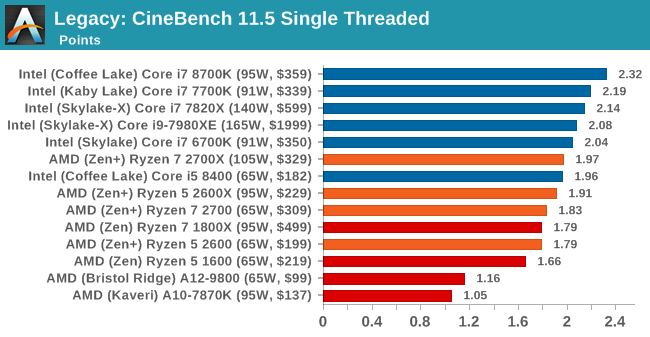

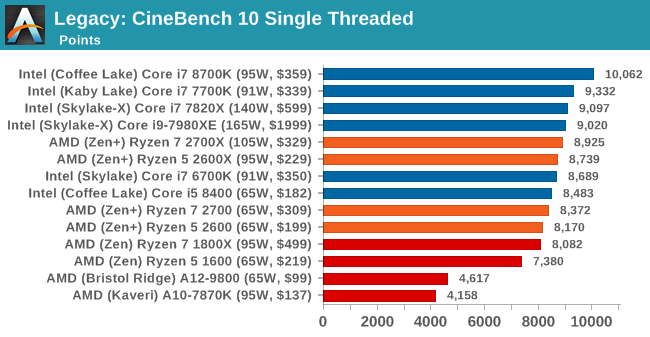
x264 HD 3.0
Similarly, the x264 HD 3.0 package we use here is also kept for historic regressional data. The latest version is 5.0.1, and encodes a 1080p video clip into a high quality x264 file. Version 3.0 only performs the same test on a 720p file, and in most circumstances the software performance hits its limit on high end processors, but still works well for mainstream and low-end. Also, this version only takes a few minutes, whereas the latest can take over 90 minutes to run.
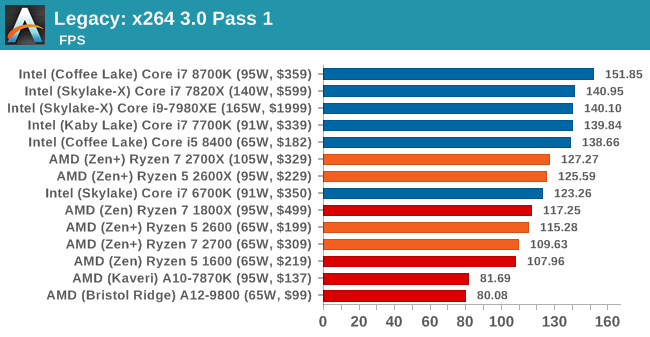
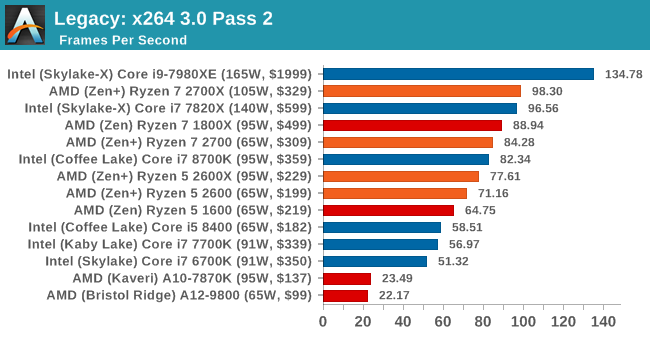










545 Comments
View All Comments
spdragoo - Thursday, April 19, 2018 - link
Per Tom's Hardware (https://www.tomshardware.com/reviews/amd-ryzen-7-2..."Our test rigs now include Meltdown And Spectre Variant 1 mitigations. Spectre Variant 2 requires both motherboard firmware/microcode and operating system patches. We have installed the operating system patches for Variant 2.
Today's performance measurements do not include Intel's motherboard firmware mitigations for Spectre Variant 2 though, as we've been waiting for AMD patches to level the playing field. Last week, AMD announced that it’s making the mitigations available to motherboard vendors and OEMs, which the company says should take time to appear in the wild. We checked MSI's website for firmware updates applicable to our X370 platforms when AMD made its announcement, but no new BIOSes were available (and still aren't).
Unfortunately, we were only made aware that Variant 2 mitigations are present in our X470 board's firmware just before launch, precluding us from re-testing the Intel platforms with patches applied. We're working on this now, and plan to post updated results in future reviews.
The lack of Spectre Variant 2 patches in our Intel results likely give the Core CPUs a slight advantage over AMD's patched platforms. But the performance difference should be minimal with modern processors."
For those that are TL:DR in their viewpoint: unlike Anandtech, TH did NOT include all of the Spectre/Meltdown patches, & even said that there might be differences in their test results.
Chris113q - Thursday, April 19, 2018 - link
Other reviewers also had their setups meltdown/spectre patched and it's been already confirmed that these patches don't greatly impact gaming performance at all.It's clear that Anandtech's results are wrong here. I have read 12 other reviews and most of their results differ from the ones you got. You'd have to be delusional to take just 1 review as the absolute truth.
Ninjawithagun - Thursday, April 19, 2018 - link
Incorrect. Those reviews were conducted back in January 2018 (look at the review dates). Microsoft issued new patches for Meltdown and Spectre earier this month (April 2018). I could find no other performance review showing performance gain/loss for Intel CPUs based upon the new patches other than the one posted now by AnandTech.Ninjawithagun - Thursday, April 19, 2018 - link
The only way to know for sure is for each hardware reviewer to provide the exact version of Windows 10 they used for testing. This will prove whether or not they ran benchmarks with the most current Windows updates/patches.Intel999 - Thursday, April 19, 2018 - link
It is plausible that many reviewers were lazy and carried over data from earlier reviews on Intel and 1000 series Ryzen CPUs.Thank you Anandtech for doing aa genuinely unbiased review that required a great deal of extra work compared to others.
5080 - Thursday, April 19, 2018 - link
And don't forget BIOS patches as well. If you have a fully patched system the impact is even bigger than just updating with the Windows KB patches.sor - Thursday, April 19, 2018 - link
Looking at Tom’s results, they have OC intels in first place. Other than that it’s damn close. Is there a chance you’re just browsing graphs to see who is in the top spot and not really comprehending the results?Aside from that, the test setups and even benchmarks used are different. You owe Ian an apology for not realizing you’re comparing OC results to his.
Silma - Thursday, April 19, 2018 - link
Yes. Ian is a top reviewer. At worst he made a mistake in this evaluations. It happens to the best of us.However, I have an issue with non OC test. It seems to me people will purchase overclockable processors and graphic cards to overclock them. At least game results should probably be based on OC benchmarks.
pogostick - Thursday, April 19, 2018 - link
@Silma No, it makes more sense to do it this way. Everyone who buys these processors are guaranteed to have a part that will run the manufacturer spec. OC is a random lottery.ACE76 - Thursday, April 19, 2018 - link
Wrong... majority of even gamers DON'T overclock...that us relagated to a niche market of enthusiasts.